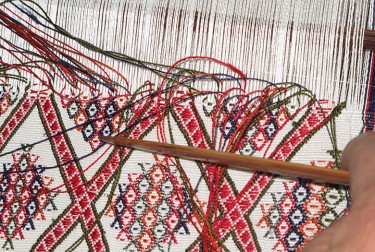
The Art of Bhutanese Weaving from Dara Artisans
Textile experts widely acknowledge Bhutanese weaving to be among the most sophisticated and time consuming in the world.
Renowned furniture designer Tucker Robbins has a vision for world peace.
“We need to start by building community,” he explains. It sounds simple, but it’s working.
Thirty years ago, Tucker was on the cusp of a significant life change. After living in an ashram for more than a decade, he felt the urge to engage with the outside world and share his sense of inner peace, transforming it into an external experience for the benefit of others.
Eager for a shift in scenery, he accepted an offer to help his friend establish a weaving cooperative in Guatemala. Tucker fell in love with Guatemalan craftsmanship and started buying furniture and textiles to sell back in the United States. To his surprise and delight, he sold out of everything immediately.
He returned to Guatemala as soon as he could, planning to invest more deeply in local craftsmanship. He developed close relationships with native artisans and encouraged collaboration among the different weaving cooperatives. At the time, Guatemala was still in the midst of a civil war, but Tucker noticed that when people began working together and forming a sense of community, they stopped fighting. Tucker was overjoyed to see how his work and peace were growing in unison.
“When we live and work together there is an understanding that builds,” Tucker reflects. “A harmonious environment develops out of necessity, because of the mutually beneficial arrangements that artisans have to go through–sourcing material, creating the piece, connecting with the buyer, etc.”
Now, to celebrate thirty years of work and collaboration, Tucker has partnered with DARA Artisans to introduce Back to Roots, his newest collection of textiles, bags, shoes, and accessories handmade in Guatemala. This collection represents the fruits of Tucker’s labor, as well as the core ideals upon which DARA was founded: a successful symbiosis of global community, artisanship, commerce, and social responsibility.
Not only is the collection a return to Tucker’s roots–the origins of his career as a furniture designer–but it is also a return to the roots of Guatemalan craft, featuring traditional handweaving and hand-dying techniques.
Tucker encouraged local artisans to stop using modern chemical dyes and instead reintroduce traditional dyes like true indigo. Many pieces from the collection also showcase the centuries-old, traditional ikat dyeing method.
Numerous local groups contributed to this collection, reinforcing the connection between artisanship and unity that both Tucker and DARA Artisans espouse so deeply. All the textiles are handwoven and dyed by women’s weaving cooperatives and independent female weavers throughout Guatemala. The shoes are handmade by a shoemaker in San Pedro with reclaimed rubber tire and handwoven cloth. An employment workshop for the mentally disabled in San Juan provided macrame tabs to decorate the weekender bag zippers.
“Artisans are the keepers of their history and the stories of their ancestors. They are the protectors of their environment and culture,” Tucker says. “By bringing them to the international marketplace, the indigenous arts are recognized and preserved. When people are engaged in this way, for the greater good of their community, there cannot be war or social injustice.”
This article appears courtesy of Dara Artisans
Website: www.daraartisans.com